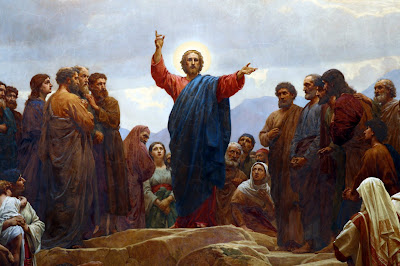In the style of the Old Testament prophets like Amos, Isaiah, and Micah, the Lord Jesus, in the Gospel today has launched into a full-scale public denunciation of the religious leaders of Jerusalem for their hypocrisy and failures in religious leadership. He literally calls them “hypocrites” and “blind guides”.
How do we read through these types of passages? How do we read any passage of Scripture?
What lesson is there, in the Lord’s criticism and condemnation of the Pharisees, for my growth of soul? The Lord’s indictment of the Pharisees should lead us, especially those involved in Christian leadership, to a sober examination of conscience. Where have I acted like a Pharisee?
In Chapter 23 of Matthew’s Gospel, the Lord issues 7 of these criticism—7 “woes”. “Woe to you” for doing THIS---this action—this hypocritical behavior.
And so if we are reading through these criticisms looking for a spiritual lesson for ourselves, then these 7 woes are like 7 questions for self-examination.
Do I practice what I preach? Do I perform ‘religious actions’ to impress others or to truly honor God?
In today’s passage we hear of two criticisms. First, the Lord says, “Woe to you, scribes and Pharisees, you hypocrites. You pay tithes of mint and dill and cummin, and have neglected the weightier things of the law: judgment and mercy and fidelity.” The Mosaic law ordered tithing of the produce of the land, and the scribes taught that such tithing extended even to the smallest herbs of your garden.
The Lord here is criticizing the preoccupation with matters of little importance while neglecting justice, mercy, and fidelity.
Have I neglected mercy because I was too caught up with a minor detail? The Christian life is to be filled with acts of justice and mercy. Have I become preoccupied with the trivial and neglected what matters most in the Christian life?
The second criticism in today’s passage: “Woe to you, scribes and Pharisees, you hypocrites. You cleanse the outside of cup and dish, but inside they are full of plunder and self-indulgence” has to do with what? The Pharisees we know were obsessive about ritual purity, while neglecting the more important matter of interior, moral purity. Purity of the heart.
Am I really doing the hard work of seeking interior conversion of my faults and vices? How much of my time and effort is dedicated to self-indulgence? We can become very very skilled at justifying self-indulgence if we aren’t careful: I deserve those three hours on the couch every day. I can tell you, self-indulgent consumerism is keeping a lot of Christians from the simplicity and works of charity God wants us to be engaging in.
I encourage you to go back and read through Matthew 23. Those seven woes, are very helpful in identifying the sorts of faults all of us Christians can develop. If you can’t deal honestly with these questions…you’re in trouble. There is some resistance to grace. But the good news is, spiritual growth is possible—through prayer, regular confession, honesty and humility. May we seek the life and spiritual growth God wants for each of us wholeheartedly, for the glory of God and salvation of souls.
- - - - -
For the flourishing of spiritual gifts in the Church and in our parish; and for the grace during this month of August to practice the virtue of humility in all of our relationships and interactions.
For our young people preparing to return to school, and for their teachers: that the Word of God might be cherished, studied, and practiced in every classroom and home.
That politicians and government officials may protect religious freedom, promote virtue, and look to the law of Christ to guide their work for the good of nations and all peoples.
For those beset with any sort of trial, illness, or burden: that the Lord will build up his strength within them and assist them in their needs.
That those who have died may share in the joy of life-everlasting with the Risen Lord, especially the deceased members of our families, friends, and parish, and all the souls in purgatory…
O God, who know that our life in this present age is subject to suffering and need, hear the prayers of those who cry to you and receive the prayers of those who believe in you. Through Christ our Lord.








